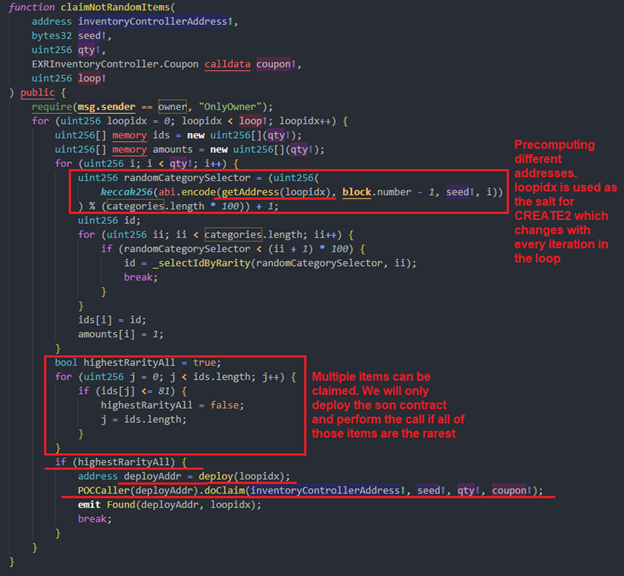
🚨 NFT & Gaming Security Alert for #EVM / #solidity projects 🚨
🧵 time on why weak PRNG can lead to technical users winning everything…
🧵 time on why weak PRNG can lead to technical users winning everything…
First, we're excited to announce our audit of @exiledracers' smart contract - in the lead up to their mint on May 31. ✅
Our work together helped identify this ecosystem-wide issue of a weak pseudo-random number generator (PRNG) + Signature frontrunning/replay
Our work together helped identify this ecosystem-wide issue of a weak pseudo-random number generator (PRNG) + Signature frontrunning/replay
The weak PRNG issue is way too common in the #gaming ecosystem. If you are not using @chainlink VRF and want to generate a PRNG, never use msg.sender or a controlled address in the generation.
At the time of the audit of the EXR contracts, @MoonbeamNetwork did not have an implementation of Chainlink’s VRF or an equivalent solution for generating randomness.
In an attempt to further reduce miners’ ability to interfere, the EXR team introduced a seed that’s generated off-chain to be used in combination with the caller’s address.
Exiled Racers used an internal function named _claimRandomItems() to generate a pseudo-random number #️⃣:
Exiled Racers used an internal function named _claimRandomItems() to generate a pseudo-random number #️⃣:

The number #️⃣ was generated with:
✔️ The address of the caller
✔️ The current block number of the transaction minus one
✔️ A seed known by the user before the call
With this #️⃣, different item rarities were chosen: Common (50% chance), Mid (35% chance), Rare (15% chance).
✔️ The address of the caller
✔️ The current block number of the transaction minus one
✔️ A seed known by the user before the call
With this #️⃣, different item rarities were chosen: Common (50% chance), Mid (35% chance), Rare (15% chance).
When the address of the caller is involved, there can be a real security threat ☠️
@solidity_lang’s opcode CREATE2 predicts a contract’s address without creating it. So how can this be abused?
@solidity_lang’s opcode CREATE2 predicts a contract’s address without creating it. So how can this be abused?
First, let's create a contract called POCCaller which will be the contract address that will call the _claimRandomItems() function getting us the rarest item: 

This contract will be deployed at a precomputed “winning” address calculated by a contract called POC using CREATE2.
The “father” contract POC identifies a deployment address for the POCCaller contract that will win the game.
The “father” contract POC identifies a deployment address for the POCCaller contract that will win the game.
With every iteration in the loop ➰, we precompute a contract address using the getAddress(<salt>) function: 

Once we precompute the address, we check in our contract if it is going to give us the highest rarity. The contract logic from the Exiled Racers contract is copied into our POC contract. If the precomputed address is a winning one, we deploy the contract with the same salt: 

As we could see in the claimNotRandomItems() function above we are looking for item categories >81. Here we are claiming with our exploit contract 2 items with a category > 81: 

To prevent this, smart contracts should be blocked from calling PRNG functions by using this require statement:
require(msg.sender == tx.origin, "Contracts cannot mint");
require(msg.sender == tx.origin, "Contracts cannot mint");
And, of course, NEVER use msg.sender or a controlled address when generating a pseudo-random number.
Great working with @exiledracers on security!
For their mint details : blog.exiledracers.com/e9b716cc4f3a
For their mint details : blog.exiledracers.com/e9b716cc4f3a
Follow us @HalbornSecurity for more on our smart contract audits and be sure to sign up for our newsletter for the latest #blockchainsecurity recaps: halborn.us20.list-manage.com/subscribe/post…
• • •
Missing some Tweet in this thread? You can try to
force a refresh





